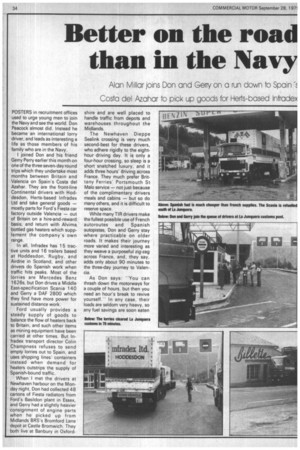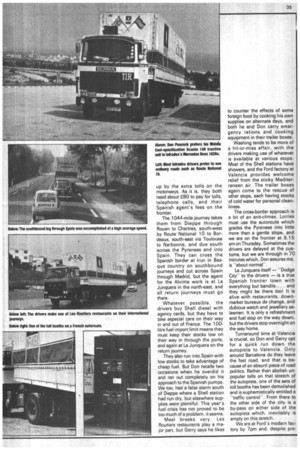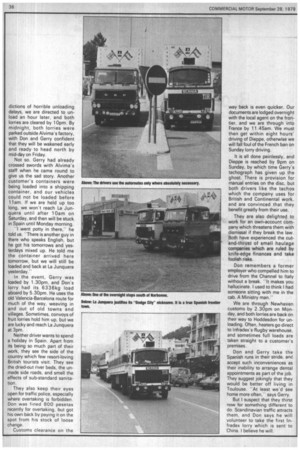Better on the road than in the Navy
Page 36

Page 37

Page 38

If you've noticed an error in this article please click here to report it so we can fix it.
Alan Millar joins Don and Gerry on a run down to Spain Costa del Azahar to pick up goods for Herts-based Infradex
POSTERS in recruitment offices used to urge young men to join the Navy and see the world. Don Peacock almost did. Instead he became an international lorry driver, and leads as interesting a life as those members of his family who are in the Navy.
I joined Don and his friend Gerry Perry earlier this month on one of the three seven-day round trips which they undertake most months between Britain and Valencia on Spain's Costa del Azahar. They are the front-line Continental drivers with Hoddesdon, Herts-based Infradex Ltd and take general goods — mostly parts for Ford's Fiesta car factory outside Valencia — out of Britain on a hire-and-reward basis, and return with Alvima. bottled gas heaters which supplement the company's own range.
In all, Infradex has 15 tractive units and 16 trailers based at Hoddesdon, Rugby, and Airdrie in Scotland, and other drivers do Spanish work when traffic hits peaks. Most of the lorries are Mercedes Benz 1626s, but Don drives a Middle East-specification Scania 140 and Gerry a DAF 2800 which they find have more power for sustained distance work.
Ford usually provides a steady supply of goods to balance the flow of heaters back to Britain, and such other items as mining equipment have been carried at other times. But Infradex transport director Colin Champness refuses to send empty lorries out to Spain, and uses shipping lines' containers instead when demand for heaters outstrips the supply of Spanish-bound traffic.
When I met the drivers at Newhaven harbour on the Monday night, Don had collected 48 cartons of Fiesta radiators from Ford's Basildon plant in Essex, and Gerry had a slightly heavier consignment of engine parts when he picked up from Midlands BRS's Brornford Lane depot at Castle Bromwich. They both live at Banbury in Oxford shire and are well placed to handle traffic from depots and warehouses throughout the Midlands.
The Newhaven Dieppe Sealink crossing is very much second-best for these drivers, who adhere rigidly to the eighthour driving day. It is only a four-hour crossing, so sleep is a short snatched luxury, and it adds three hours' driving across France. They much prefer Brittany Ferries' Portsmouth St Malo service — not just because of the complimentary drivers meals and cabins — but so do many others, and it is difficult to reserve space.
While many TIR drivers make the fullest possible use of French autoroutes and Spanish autopistas, Don and Gerry stay where practicable on older roads. It makes their journey more varied and interesting as they weave a purposeful zig-zag across France, and, they say, adds only about 90 minutes to the three-day journey to Valencia.
As Don says: "You can thrash down the motorways for a couple of hours, but then you need an hour's break to revive yourself." In any case, their loads are seldom very heavy, so any fuel savings are soon eaten up by the extra tolls on the motorways. As it is, they both need about £80 to pay for tolls, telephone calls, and their Spanish agent's fees on the frontier.
The 1044-mile journey takes them from Dieppe through Rouen to Chartres, south-west by Route National 10 to Bordeaux, south-east via Toulouse to Narbonne, and due south 'across the Pyrenees and into Spain. They can cross the Spanish border at Irun in Basque country on southbound journeys and cut across Spain through Madrid, but the agent for the Alvima work is at La Junquera in the north-east, and all return journeys must go there.
Whatever possible, the drivers buy Shell diesel with agency cards, but they have to take especial care on their way in and out of France. The 100litre fuel import limit means they must keep their stocks low on their way in through the ports, and again at La Junquera on the return journey.
They also run into Spain with low stocks to take advantage of cheap fuel. But Don recalls two occasions when he overdid it and ran out completely on his approach to the Spanish pumps. We too, had a false alarm south of Dieppe where a Shell station had run dry, but elsewhere supplies were plentiful. This year's fuel crisis has not proved to be too much of a problem, it seems.
Meal breaks vary. Les Routiers restaurants play a major part, but Gerry says he likes
to counter the effects of some foreign food by cooking his own supplies on alternate days, and both he and Don carry emergency rations and cooking equipment in -their trailer boxes.
Washing tends to be more of a hit-or-miss affair, with the drivers making use of whatever is available at various stops. Most of the Shell stations have showers, and the Ford factory at Valencia provides welcome relief from the sticky Mediterranean air. The trailer boxes again come to the rescue of other stops, each having stocks of cold water for personal cleanliness.
The cross-border approach is a bit of an anti-climax. Lorries must use the autoroute which grades the Pyrenees into little more than a gentle slope, and we are on the frontier at 9.15 am on Thursday. Sometimes the drivers are delayed at the customs, but we are through in '70 minutes which, Don assures me, is -about normal".
La Junquera itself — "Dodge City" to the drivers — is a true Spanish frontier town with everything but bandits . . and they might be there too! It is alive with restaurants, downmarket bureaux de change, and dubious watch and jewellery salesmen. It is only a refreshment and fuel stop on the way down, but the drivers stop overnight on the way home.
Turnaround time at Valencia is crucial, so Don and Gerry opt for a quick run down the autopista to Valencia. Only around Barcelona do they leave the fast road, and that is because of an absurd piece of road politics. Rather than abolish unpopular tolls on that stretch of the autopista, one of the sets of .toll booths has been demolished and is euphemistically entitled a "traffic control". From there to the other side of the city is a by-pass on either side of the autopista which, inevitably is empty on this stretch.
We are at Ford's modern factory by 7pm and, despite pre dictions of horrible unloading delays, we are directed to unload an hour later, and both lorries are cleared by lOpm. By midnight, both lorries were parked outside Alvima's factory, with Don and Gerry confident that they will be wakened early and ready to head north by mid-day on Friday.
Not so. Gerry had already crossed swords with Alvima's staff when he came round to give us the sad story. Another customer's containers were being loaded into a shipping container, and our vehicles could not be loaded before 11am. If we are held up too long, we won't reach La Junquera until after 10am on Saturday, and then will be stuck in Spain until Monday morning.
"I went potty in there," he told us. -There is another guy in there who speaks English, but he got his tomorrows and yesterdays mixed up. He told me the container arrived here tomorrow, but we will still be loaded and back at La Junquera yesterday.
In the event, Gerry was loaded by 1.30pm, and Don's lorry had its 6336kg load aboard by 5.30pm. He uses the old Valencia-Barcelona route for much of the way, weaving in and out of old towns and villages. Sometimes, convoys of fruit lorries hold him up, but we are lucky and reach La Junquera at 3pm.
Neither driver wants to spend a holiday in Spain. Apart from its being so much part of their work, they see the side of the country which few resort-loving British tourists visit. They see the dried-out river beds, the unmade side roads, and smell the effects of sub-standard sanitation.
They also keep their eyes open for traffic police, especially where overtaking is forbidden. Don was fined 800 pesetas recently for overtaking, but got his own back by paying it on the spot from his stock of loose change.
Customs clearance on the way back is even quicker. Our documents are lodged overnight with the local agent on the frontier, and we are through into France by 11.45am. We must then get within eight hours' driving of Dieppe, otherwise we will fall foul of the French ban on Sunday lorry driving.
It is all done painlessly, and Dieppe is reached by 9pm on Sunday, by which time Gerry's tachograph has given up the ghost. There is provision for manual entries on the disc, but both drivers like the tachos which the company uses for British and Continental work, and are convinced that they benefit greatly from their use.
They are also delighted to work for an own-account company which threatens them with dismissal if they break the law. Both have experienced the cutand-thrust of small haulage companies which are ruled by knife-edge finances and take foolish risks.
Don remembers a former employer who compelled him to drive from the Channel to Italy without a break. "It makes you hallucinate. I used to think I had someone sitting with me in the cab. A Ministry man."
We are through Newhaven customs by 2.30pm on Monday, and both lorries are back on their way to Hoddesdon for unloading. Often, heaters go direct to Infradex's Rugby warehouse, and sometimes full loads are taken straight to a customer's premises.
Don and Gerry take the Spanish runs in their stride, anc accept such inconveniences as their inability to arrange dental appointments as part of the job. They suggest jokingly that they would be better off living in Toulouse. -At least we'd see home more often," says Gerry.
But I suspect that they thirst now for something different to do. Scandinavian traffic attracts them, and Don says he will volunteer to take the first Infradex lorry which is sent to China. I believe he will




























































































































































